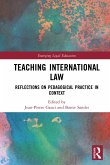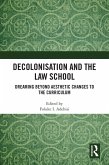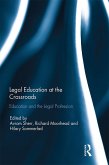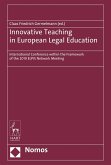Teaching International Law (eBook, PDF)
Reflections on Pedagogical Practice in Context
Redaktion: Gauci, Jean-Pierre; Sander, Barrie
41,95 €
41,95 €
inkl. MwSt.
Sofort per Download lieferbar

21 °P sammeln
41,95 €
Als Download kaufen

41,95 €
inkl. MwSt.
Sofort per Download lieferbar

21 °P sammeln
Jetzt verschenken
Alle Infos zum eBook verschenken
41,95 €
inkl. MwSt.
Sofort per Download lieferbar
Alle Infos zum eBook verschenken

21 °P sammeln
Teaching International Law (eBook, PDF)
Reflections on Pedagogical Practice in Context
Redaktion: Gauci, Jean-Pierre; Sander, Barrie
- Format: PDF
- Merkliste
- Auf die Merkliste
- Bewerten Bewerten
- Teilen
- Produkt teilen
- Produkterinnerung
- Produkterinnerung

Bitte loggen Sie sich zunächst in Ihr Kundenkonto ein oder registrieren Sie sich bei
bücher.de, um das eBook-Abo tolino select nutzen zu können.
Hier können Sie sich einloggen
Hier können Sie sich einloggen
Sie sind bereits eingeloggt. Klicken Sie auf 2. tolino select Abo, um fortzufahren.

Bitte loggen Sie sich zunächst in Ihr Kundenkonto ein oder registrieren Sie sich bei bücher.de, um das eBook-Abo tolino select nutzen zu können.
This volume brings together a diversity of scholars and practitioners to share their experiences and critically reflect on current practices of teaching international law across various contexts, traditions, and perspectives.
- Geräte: PC
- ohne Kopierschutz
- eBook Hilfe
- Größe: 12.72MB
Andere Kunden interessierten sich auch für
![Teaching International Law (eBook, ePUB) Teaching International Law (eBook, ePUB)]() Teaching International Law (eBook, ePUB)41,95 €
Teaching International Law (eBook, ePUB)41,95 €![Research Methods in Human Rights (eBook, PDF) Research Methods in Human Rights (eBook, PDF)]() Research Methods in Human Rights (eBook, PDF)37,95 €
Research Methods in Human Rights (eBook, PDF)37,95 €![Decolonisation and the Law School (eBook, PDF) Decolonisation and the Law School (eBook, PDF)]() Decolonisation and the Law School (eBook, PDF)52,95 €
Decolonisation and the Law School (eBook, PDF)52,95 €![Legal Education at the Crossroads (eBook, PDF) Legal Education at the Crossroads (eBook, PDF)]() Legal Education at the Crossroads (eBook, PDF)45,95 €
Legal Education at the Crossroads (eBook, PDF)45,95 €![Innovative Teaching in European Legal Education (eBook, PDF) Innovative Teaching in European Legal Education (eBook, PDF)]() Innovative Teaching in European Legal Education (eBook, PDF)48,00 €
Innovative Teaching in European Legal Education (eBook, PDF)48,00 €![Slapper and Kelly's The English Legal System (eBook, PDF) Slapper and Kelly's The English Legal System (eBook, PDF)]() David KellySlapper and Kelly's The English Legal System (eBook, PDF)43,95 €
David KellySlapper and Kelly's The English Legal System (eBook, PDF)43,95 €![Teaching Law (eBook, PDF) Teaching Law (eBook, PDF)]() Robin L. WestTeaching Law (eBook, PDF)26,95 €
Robin L. WestTeaching Law (eBook, PDF)26,95 €-
-
-
This volume brings together a diversity of scholars and practitioners to share their experiences and critically reflect on current practices of teaching international law across various contexts, traditions, and perspectives.
Dieser Download kann aus rechtlichen Gründen nur mit Rechnungsadresse in A, B, BG, CY, CZ, D, DK, EW, E, FIN, F, GR, HR, H, IRL, I, LT, L, LR, M, NL, PL, P, R, S, SLO, SK ausgeliefert werden.
Produktdetails
- Produktdetails
- Verlag: Taylor & Francis
- Seitenzahl: 424
- Erscheinungstermin: 26. Juni 2024
- Englisch
- ISBN-13: 9781040032831
- Artikelnr.: 70764306
- Verlag: Taylor & Francis
- Seitenzahl: 424
- Erscheinungstermin: 26. Juni 2024
- Englisch
- ISBN-13: 9781040032831
- Artikelnr.: 70764306
- Herstellerkennzeichnung Die Herstellerinformationen sind derzeit nicht verfügbar.
Jean-Pierre Gauci is Arthur Watts Senior Research Fellow in Public International Law and Director of Teaching and Training at BIICL. He holds a PhD in Law from King's College London and a Doctor of Laws and Magister Juris in International Law from the University of Malta. Jean-Pierre is also co-founder and co-director of The People for Change Foundation, a human rights think tank based in Malta; a consultant to international and national governmental and non-governmental organizations; and a lecturer in International Migration law and Ocean governance at the University of Malta. His primary areas of work include: migration and refugee law, human trafficking law and policy, and international labour law. Barrie Sander is Assistant Professor of International Justice at the Faculty of Governance and Global Affairs, Leiden University, where he teaches at Leiden University College The Hague. His research interests include international criminal law, international human rights law, and the intersection of digital technology and international law. He is the author of Doing Justice to History: Confronting the Past in International Criminal Courts (OUP 2021), based on his PhD thesis, which was awarded the Graduate Institute of International and Development Studies Alumni Association Prize 2021. He has also published in a wide range of international law journals, including European Journal of International Law, London Review of International Law, and Leiden Journal of International Law, and was awarded the Young Scholar Prize 2018 by International and Comparative Law Quarterly .
1. Introduction: Teaching International Law - Reflections on Pedagogical Practice in Context
Part I: Reflexivity
2. Apathy, Aphasia & Athambia: Teaching Jamestown and Parodying the History of International Law
3. Teaching International Criminal Law from a Critical Perspective: Decentering the Law and the Teacher
4. A 'Global South/Third World' Perspective on International Law Teaching
5. Teaching and (Un)learning International Law in Qatar
6. Cultural Interactions with the Pedagogy of International Law: Challenges and Opportunities
7. Humanising the Teaching of International Law
8. Reflections on Teaching 'Emotion Bites' in an LLM Course on Human Rights and Conflict Resolution
Part II: Tools and Techniques
9. From Podcast to Utopia: Hope and Doubt Behind Knowledge Production in International Legal Academia
10. The Dynamics of Writing and the 'Good' International Law Textbook
11. Reading Groups on International Law: The Role of Co-Creation in Decolonising the Curriculum
12. Decolonising the Teaching of International Humanitarian Law
13. Interdisciplinary Simulations as Innovative Teaching Formats - Experiences from an International Law Classroom
14. Teaching Law of Armed Conflict with Virtual Reality
15. Teaching International Humanitarian Law in Crisis
Part III: Contexts
16. "Teacher, Don't Teach Me Nonsense!": A Personal Reflection on Teaching International Law in Nigeria
17. International Law in the Middle East: A Pedagogy of Critical Absences
18. Between History and Pedagogy: Teaching the Philippine National Territorial Imaginary - its 'Geo-Body' - After the 2016 South China Sea Arbitral Award
19. Teaching Public International Law in Brazil and the Unintended Impact of the Bar Exam
20. Teaching Future Military Commanders International Humanitarian Law
21. Teaching to Wuhan in the Time of Corona
22. Teaching International Law through the Prism of Global Events
Part IV: Specialised Areas
23. The Migration Law Programme: Inspiration for Teaching of International Law
24. Teaching and Learning International Climate Change Law
25. The Irrelevance and Coloniality of International Economic Law: How African Teachers Must Drum Them Away
26. The Gender of International Human Rights Law? Uncovering Legal Academics' Views on Teaching Women's Rights
27. Connecting Transnational and International Criminal Law in the Classroom
28. Should Militaries Teach International Humanitarian Law and Ethics Together? Comparing the Attitudes of Educators Internationally
29. Subject or Skill? Teaching (and Learning) International Law as an International Relations Scholar
Part I: Reflexivity
2. Apathy, Aphasia & Athambia: Teaching Jamestown and Parodying the History of International Law
3. Teaching International Criminal Law from a Critical Perspective: Decentering the Law and the Teacher
4. A 'Global South/Third World' Perspective on International Law Teaching
5. Teaching and (Un)learning International Law in Qatar
6. Cultural Interactions with the Pedagogy of International Law: Challenges and Opportunities
7. Humanising the Teaching of International Law
8. Reflections on Teaching 'Emotion Bites' in an LLM Course on Human Rights and Conflict Resolution
Part II: Tools and Techniques
9. From Podcast to Utopia: Hope and Doubt Behind Knowledge Production in International Legal Academia
10. The Dynamics of Writing and the 'Good' International Law Textbook
11. Reading Groups on International Law: The Role of Co-Creation in Decolonising the Curriculum
12. Decolonising the Teaching of International Humanitarian Law
13. Interdisciplinary Simulations as Innovative Teaching Formats - Experiences from an International Law Classroom
14. Teaching Law of Armed Conflict with Virtual Reality
15. Teaching International Humanitarian Law in Crisis
Part III: Contexts
16. "Teacher, Don't Teach Me Nonsense!": A Personal Reflection on Teaching International Law in Nigeria
17. International Law in the Middle East: A Pedagogy of Critical Absences
18. Between History and Pedagogy: Teaching the Philippine National Territorial Imaginary - its 'Geo-Body' - After the 2016 South China Sea Arbitral Award
19. Teaching Public International Law in Brazil and the Unintended Impact of the Bar Exam
20. Teaching Future Military Commanders International Humanitarian Law
21. Teaching to Wuhan in the Time of Corona
22. Teaching International Law through the Prism of Global Events
Part IV: Specialised Areas
23. The Migration Law Programme: Inspiration for Teaching of International Law
24. Teaching and Learning International Climate Change Law
25. The Irrelevance and Coloniality of International Economic Law: How African Teachers Must Drum Them Away
26. The Gender of International Human Rights Law? Uncovering Legal Academics' Views on Teaching Women's Rights
27. Connecting Transnational and International Criminal Law in the Classroom
28. Should Militaries Teach International Humanitarian Law and Ethics Together? Comparing the Attitudes of Educators Internationally
29. Subject or Skill? Teaching (and Learning) International Law as an International Relations Scholar
1. Introduction: Teaching International Law - Reflections on Pedagogical Practice in Context
Part I: Reflexivity
2. Apathy, Aphasia & Athambia: Teaching Jamestown and Parodying the History of International Law
3. Teaching International Criminal Law from a Critical Perspective: Decentering the Law and the Teacher
4. A 'Global South/Third World' Perspective on International Law Teaching
5. Teaching and (Un)learning International Law in Qatar
6. Cultural Interactions with the Pedagogy of International Law: Challenges and Opportunities
7. Humanising the Teaching of International Law
8. Reflections on Teaching 'Emotion Bites' in an LLM Course on Human Rights and Conflict Resolution
Part II: Tools and Techniques
9. From Podcast to Utopia: Hope and Doubt Behind Knowledge Production in International Legal Academia
10. The Dynamics of Writing and the 'Good' International Law Textbook
11. Reading Groups on International Law: The Role of Co-Creation in Decolonising the Curriculum
12. Decolonising the Teaching of International Humanitarian Law
13. Interdisciplinary Simulations as Innovative Teaching Formats - Experiences from an International Law Classroom
14. Teaching Law of Armed Conflict with Virtual Reality
15. Teaching International Humanitarian Law in Crisis
Part III: Contexts
16. "Teacher, Don't Teach Me Nonsense!": A Personal Reflection on Teaching International Law in Nigeria
17. International Law in the Middle East: A Pedagogy of Critical Absences
18. Between History and Pedagogy: Teaching the Philippine National Territorial Imaginary - its 'Geo-Body' - After the 2016 South China Sea Arbitral Award
19. Teaching Public International Law in Brazil and the Unintended Impact of the Bar Exam
20. Teaching Future Military Commanders International Humanitarian Law
21. Teaching to Wuhan in the Time of Corona
22. Teaching International Law through the Prism of Global Events
Part IV: Specialised Areas
23. The Migration Law Programme: Inspiration for Teaching of International Law
24. Teaching and Learning International Climate Change Law
25. The Irrelevance and Coloniality of International Economic Law: How African Teachers Must Drum Them Away
26. The Gender of International Human Rights Law? Uncovering Legal Academics' Views on Teaching Women's Rights
27. Connecting Transnational and International Criminal Law in the Classroom
28. Should Militaries Teach International Humanitarian Law and Ethics Together? Comparing the Attitudes of Educators Internationally
29. Subject or Skill? Teaching (and Learning) International Law as an International Relations Scholar
Part I: Reflexivity
2. Apathy, Aphasia & Athambia: Teaching Jamestown and Parodying the History of International Law
3. Teaching International Criminal Law from a Critical Perspective: Decentering the Law and the Teacher
4. A 'Global South/Third World' Perspective on International Law Teaching
5. Teaching and (Un)learning International Law in Qatar
6. Cultural Interactions with the Pedagogy of International Law: Challenges and Opportunities
7. Humanising the Teaching of International Law
8. Reflections on Teaching 'Emotion Bites' in an LLM Course on Human Rights and Conflict Resolution
Part II: Tools and Techniques
9. From Podcast to Utopia: Hope and Doubt Behind Knowledge Production in International Legal Academia
10. The Dynamics of Writing and the 'Good' International Law Textbook
11. Reading Groups on International Law: The Role of Co-Creation in Decolonising the Curriculum
12. Decolonising the Teaching of International Humanitarian Law
13. Interdisciplinary Simulations as Innovative Teaching Formats - Experiences from an International Law Classroom
14. Teaching Law of Armed Conflict with Virtual Reality
15. Teaching International Humanitarian Law in Crisis
Part III: Contexts
16. "Teacher, Don't Teach Me Nonsense!": A Personal Reflection on Teaching International Law in Nigeria
17. International Law in the Middle East: A Pedagogy of Critical Absences
18. Between History and Pedagogy: Teaching the Philippine National Territorial Imaginary - its 'Geo-Body' - After the 2016 South China Sea Arbitral Award
19. Teaching Public International Law in Brazil and the Unintended Impact of the Bar Exam
20. Teaching Future Military Commanders International Humanitarian Law
21. Teaching to Wuhan in the Time of Corona
22. Teaching International Law through the Prism of Global Events
Part IV: Specialised Areas
23. The Migration Law Programme: Inspiration for Teaching of International Law
24. Teaching and Learning International Climate Change Law
25. The Irrelevance and Coloniality of International Economic Law: How African Teachers Must Drum Them Away
26. The Gender of International Human Rights Law? Uncovering Legal Academics' Views on Teaching Women's Rights
27. Connecting Transnational and International Criminal Law in the Classroom
28. Should Militaries Teach International Humanitarian Law and Ethics Together? Comparing the Attitudes of Educators Internationally
29. Subject or Skill? Teaching (and Learning) International Law as an International Relations Scholar







